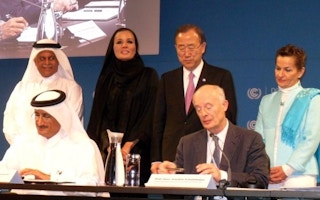Doha, Qatar - Oil and gas-rich Qatar is setting up its first Climate Change Research Institute in partnership with the Germany-based Postdam Institute for Climate Impact Research (PIK) by 2014, which aims to address critical gaps in research on mitigation, adaptation and climate resiliency in the Arab region.
The planned research institute will tackle extreme climate events, water systems, ecosystems, food production, public health and sustainable urban development. The center forms part of Qatar’s commitment to invest a total of 2.8 percent of the country’s gross domestic product (GDP) in research.
The Qatar Foundation and the PIK signed a partnership to establish the centre at an event on Wednesday on the sidelines of the United Nations climate talks held in Doha this week.
UN Secretary General Ban Ki-moon, UN climate chief Christiana Figueres, Doha climate talks President Abdullah bin Hamad Al-Attiyah and Qatar Foundation Chairperson Sheikha Moza bint Nasser were present at the signing.
“Qatar can be a model for the entire region. You need fresh ideas, initiatives and compelling evidence to rightly address climate change,” PIK founding director Hans Joachim Schellnhuber said at the press conference.
Schellnhuber said the research centre “reveals our shared belief in the critical importance of science-based action to address climate change, and that solutions have to be found urgently in order to prevent dangerous global warming from happening and to make countries like Qatar climate-smart.”
Speaking at a press conference on Wednesday, Faisal bin Mohammed Al Suwaidi, President of the Qatar Foundation’s Research Development said positioning the centre in Qatar will strike a balance between the country’s rapid growth and policies on climate and sustainability.
“By fostering collaborations and sharing of knowledge, we are certain the we can build the capacity and technology required to address the challenges at hand, to adapt and to mitigate environmental risks,” Suwaidi said.
The announcement of the establishment of the first research center in Qatar coincides with the release of a World Bank report at the Doha climate talks titled, “Adaptation to a Changing Climate in the Arab Countries,” which cautioned that climate change will affect most of the 340 million people in the Arab region, including Qatar.
The report said that climate change has already affected more than 50 million people in the Arab region, with reported cost of more than US$12 billion of damages over the past 30 years due to the impacts of climate change.
“Climate change threatens to roll back the prosperity that so many people enjoy. Reducing vulnerability to climate change will require concerted action on multiple levels,” World Bank Vice-President for Sustainable Development Rachel Kyte told reporters here on Wednesday at the launch of the report.
The World Bank report provides an assessment of the impact of the changing climate on the region, and offers a set of policy actions to avert such adverse effects.
The report reinforces the warning that decades of poverty reduction efforts could be reversed as harsher climate threatens livelihoods throughout the region. It stresses that adaptation should be integrated into all national policies and actions to ensure a climate-resilient region.








